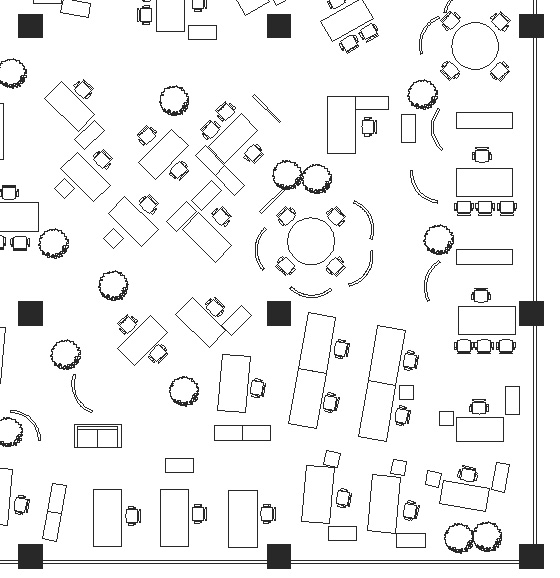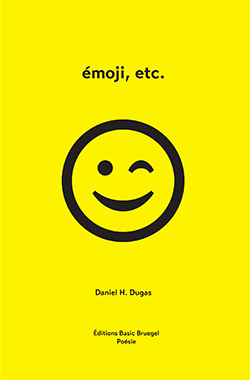Jim and I (2019)

My bank went through a rejuvenation treatment also known as a ‘renovation.’ The contractors worked mostly at night and then, the bank closed altogether for a few days. When it came back into the physical world, it was as an open-concept entity.
As far as transformation goes, this was an important re-emergence. The bank is more spacious and brighter, with little restaurant-booths-like stations on the side. I like to think that customers could sit there to dream of cheesecakes and other delights. The only thing missing, it seems, is a Ping-Pong table. But as I waited in line, yes there is still a queue area – a difficult concept to fathom in an open-plan design, I started to think of how strange the whole thing is. What is this openness all about? Is the bank really open, or does it just feel open?
Banks have always thrived on the idea of privacy, of cubicles, of safety deposit boxes and even if the appearance of the bank happens to change, the invisible walls are probably as thick now as they were before. It probably boils down to simple economics; fewer wall surfaces and less maintenance might translate into more profits. All of the above advantages come into play without mention of the fact that an open banking surface becomes easier to monitor. In fact, my bank’s openness might be closer to Jeremy Bentham’s Panopticon than to Frank Lloyd Wright’s pioneering open-plan designs, which “represented the promise of a new social ideal […] that would […] allow egalitarian integration”.[1]
But now, why would a bank – not the most benevolent entity in the world – care about egalitarian integration? I think that by opting for an open-plan layout, my bank was hoping for a magical, sympathetic effect; that seeing the openness of the space; we could automatically assign these perceptions to the bank itself. In short, that we could believe that the bank is as open, generous and honest as the space it occupies.
So here it is, my new bank, based on the foundation of my old bank. A wolf dressed up as a grandmother has opened its doors to welcome me, to do business with me. I wait in a line that is as long as the one before. Then, I notice a smiling clerk getting up and walking toward me. “Hi, I’m Jim, how can I help you today.” It is nice of him to say that, but there is something artificial about our first contact, something uncomfortable. The script will be restated over and over in the coming weeks, months and years. No doubt, it will come to sound more natural. Meanwhile, Jim and I walk to his workstation where he opens his computer. I stand on the side, almost like being in a pub. As I enter my passcode, I realize that it signals the end of all openness. Night has suddenly fallen; the bright sunshine of my bank is no more. We are now moving in a closed-floor-plan, a world of encryption, firewalls and privacy screens.
[1] The Curse of an Open Floor Plan, The Atlantic, Ian Bogost, May 17, 2018
https://www.theatlantic.com/family/archive/2018/05/the-curse-of-an-open-floor-plan/560561/
269th anniversary of Jeremy Bentham’s birth (2017)

Today is the 269th anniversary of Jeremy Bentham’s birth. And I wonder why Google did not create a Google-Doodle for the founder of modern utilitarianism.
In his studies of English law, he realized early on that it was not “what it was said to be; neither was it what it ought to be.” In the 1770s he described his despair and resolution:
“… I entered upon the task. I had been taught to believe both in print and in conversation that it is in [its] . . . several parts as beneficial to the people as the whole together is profitable to those who study it as a profession: that it is as near to perfection as any thing can be that is human; that if it has any imperfections, they are like spots in the sun, absorbed in the splendour of superior beauties. As I advanced every page I read seemed to furnish an exception to those general rules; till at last I began to be almost at a loss to conjecture upon what particular observations could have given occasion to these magnificent positions.
… I saw crimes of the most pernicious nature pass unheeded by the law: acts of no importance put in point of punishment upon a level with the most baneful crimes: punishments inflicted without measure and without choice: satisfaction denied for the most crying injuries: the doors of justice barred against a great majority of the people by the weight of wanton and unnecessary expense: false conclusions ensured in most questions of fact by hasty and inconsistent rules of evidence: light shut out from every question of fact by fantastic and ill consider’d rules of evidence: the business of hours spun out into years: impunity extended to acknowledged guilt and compensation snatched out of the hands of injured innocence by . . . impertinent & inscrutable exemption: the measure of decision in many cases unformed: in others locked up and made the object of a monopoly: the various rights and duties of the various classes of mankind jumbled together into one immense and unsorted heap: men ruined for not knowing what they are neither enabled nor permitted even to learn: and the whole fabric of jurisprudence a labyrinth without a clew. These were some of the abominations which presented themselves to my view . . . From the view … I confess resulted a passionate desire of seeing them done away.”
Jeremy Bentham : an odyssey of ideas
by Mack, Mary Peter
Published 1963
Daniel H. Dugas
Archives
Blogroll
- A.I.R. Vallauris
- ACAD
- Adobe additional services
- Adobe Creative Cloud
- AIRIE
- Amaas
- Amazon Author Central
- ARTothèque
- Australian Poetry
- Basic Bruegel
- Bitly
- CCCA
- CDBaby
- Cycling 74
- Dissolution
- Éditions Prise de parole
- Emmedia
- eyelevelgallery
- FAVA
- Festival acadien de poésie
- Festival FRYE Festival
- FILE – Electronic Language International Festival
- Freeware list
- Fringe Online
- Galerie Sans Nom
- Gotta Minute Film Festival
- Instants Vidéo
- JUiCYHEADS
- Kindle Direct Publishing
- Klondike Institute of Art and Culture
- La Maison de la poésie de Montréal
- La Maison de la Poésie et de la Langue française Wallonie-Bruxelles
- Laboratorio Arte-Alameda
- Le Centre Jacques Cartier
- Liberated Words
- Maison Internationale de la Poésie – Arthur Haulot
- MediaPackBoard
- Miami Book Fair International
- Monoskop
- Mot Dit
- NSCAD University
- Paved Arts
- PoetryFilm
- Portail des auteurs du Nouveau-Brunswick
- RECF
- Revue Ancrages
- Salon du Livre du Grand Sudbury
- Sculpture Space
- Subtropics.org
- Sydney college for the arts
- The Centre for Contemporary Canadian Art
- The New Gallery
- Trevigliopoesia
- tumbler-documents
- V Tape
- Valerie LeBlanc
- VideoBardo
- Void Network-Κενο Δίκτυο
Categories
- #covidpoèmes
- Advertisement
- AIRIE
- Ancrages
- anthology
- Anthropocene
- Architecture
- Around Osprey
- art
- Article de presse
- arts visuels
- audio
- Australian Poetry
- Basic Bruegel Editions
- Book
- book fair
- Cafe Poet Program
- Ce qu'on emporte avec nous
- Citations gratuites
- Collaboration
- commentaire
- commentary
- Compte rendu
- conférence
- Conservation Foundation of the Gulf Coast
- COVID-19
- Critique littéraire
- culture
- Daniel Dugas
- Design
- Édition Michel-Henri
- Éditions Perce-Neige
- Éloizes
- Emmedia
- emoji etc | émoji etc
- Environnement
- essai
- essay
- Everglades
- Exhibition
- festival
- Festival acadien de poésie
- Festival Frye Festival
- FIPTR
- Flow: Big Waters
- Fundy
- Habitat
- installation
- Instants Vidéo
- interactivity
- journal
- JUiCYHEADS
- Kisii
- L'Esprit du temps
- laptop
- Leaving São Paulo
- lecture
- Livre
- logos
- Magazine
- Miami Book Fair
- Moncton 24
- novel
- OASIS
- oil spill
- perception
- performance
- Photo
- poésie
- Poetic Licence Week
- Poetry
- politics
- politique
- press
- Prise de parole
- Revue Ancrages
- salon du livre
- sculpture
- Sculpture Space
- sound
- Souvenirs
- Spirit of the Time
- Style & Artifacts
- Symposium d'art/nature
- talk
- television
- The New Gallery
- Uncategorized
- Valerie LeBlanc
- vidéo
- vidéopoésie
- Videopoetr/Vidéopoésie
- videopoetry
- visual arts
- What We Take With Us
- youth literature







